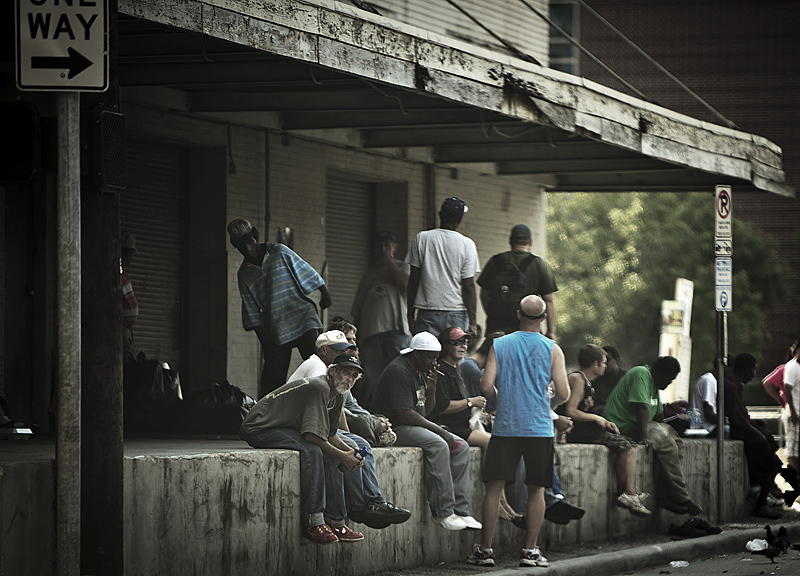This post is the fourth in a series of five parts that explains our transformation to a family on mission, written from the perspective of my husband, David. This tale also touches on why we moved to Houston and the origins of RighTrak.
“Do not be conformed to this world, but be transformed by the renewal of your mind, that by testing you may discern what is the will of God, what is good and acceptable and perfect.” – Romans 12:2
 Prelude to a Kairos
Prelude to a Kairos
Kindra and I were fortunate to have saved a respectable portion of the money I was paid, which gave me the time I needed to sort things out spiritually and emotionally. I had been developing my own law practice, but it was still in its infancy, so I had a lot of time on my hands. I filled my day with one of my favorite past times: working on our nearly 100-year old house. The project at the time was the yard. (When we bought the house, the lawn had been completely overtaken by weeds, so we had to start over.) As I was laboring away, tearing up the backyard one day in March 2011, I was approached by a man who was obviously homeless, and he asked if he could wash my car. I had just gone to the local hand car wash place a few days prior, so I didn’t have need for what he was offering. Besides that, homeless people can be creepy, and you never know if they’re just going to buy drugs or alcohol with whatever you give them. (Does this sound familiar to you?) I told the guy thanks, but no thanks, and he went on down the block.
A few moments later I regretted what I had done. Not but a week or two before, Pastor Aaron gave a sermon in which he referenced helping “the least of these,” referring to Jesus’ olivet discourse in Matthew 25: 31-40:
“When the Son of Man comes in his glory, and all the angels with him, he will sit on his glorious throne. All the nations will be gathered before him, and he will separate the people one from another as a shepherd separates the sheep from the goats. He will put the sheep on his right and the goats on his left. Then the King will say to those on his right, ‘Come, you who are blessed by my Father; take your inheritance, the kingdom prepared for you since the creation of the world. For I was hungry and you gave me something to eat, I was thirsty and you gave me something to drink, I was a stranger and you invited me in, I needed clothes and you clothed me, I was sick and you looked after me, I was in prison and you came to visit me.’ Then the righteous will answer him, ‘Lord, when did we see you hungry and feed you, or thirsty and give you something to drink? When did we see you a stranger and invite you in, or needing clothes and clothe you? When did we see you sick or in prison and go to visit you?’ The King will reply, ‘Truly I tell you, whatever you did for one of the least of these brothers and sisters of mine, you did for me.’”
Here was a guy obviously in need of help, and rather than standing on a street corner with a sign begging for change, he wanted to work for it. I respected that. I knew I had done the wrong thing by shooing him off, so I ran down the block to chase after him. When I caught up with him, I apologized for dismissing him and told him that I respected his desire to work and that, while I didn’t need my car washed, I could use some help with my landscaping. I asked if he had ever used an electric jackhammer before; he had not. I said, “Well, you’re gonna learn, then,” and we went to work.
When evening arrived and we decided to quit for the day, I paid him for his afternoon’s labors, and Kindra made him a plate for dinner so that he could stretch his hard-earned dollars a bit further. As we wrapped up, he asked, “When can I come back?” I do not know why, but I was completely unprepared for that question. I hesitated, but he had worked very hard without complaint, so we fixed a date and time for him to do other landscaping work with me. (We always worked together, so it really was “with me” and not “for me.”)
We repeated this exercise over the course of two or three weeks, several days a week. Each time we set a new date and time, and each time he showed up at the appointed time, usually about five minutes early. This impressed me for a number of reasons. First, I was kind of baffled as to how he managed to keep a schedule. He didn’t have a watch that I could see and the only cell phone he had was broken. Second, to the extent he did have problems that kept him on the streets, it seemed like he had them reasonably under control.
I learned a lot about this man during our weeks of manual labor. His name is Willie. He was from Louisiana, but he moved to Houston 40-some years ago. Willie is a felon. In 1974 Willie committed a crime and went to jail for about 15 years. He wouldn’t say exactly how long he had been on the streets, but I could tell it had been a while. He has family in Houston, but he tells me they are estranged—that’s one reason why he’s on the streets.
Recall that Willie first approached me about washing my car. Well, it turned out he actually knew a thing or two about washing cars. He had worked part-time at a local body shop as a porter moving cars around and washing them after the body work had been done. In the course of that work he received training on how long sap can sit before it gets under the clear coat, what chemicals to use on what kind of spots and splatters, etc. I had no idea there was a science behind washing cars. Unfortunately, Willie lost that job. The owner of the body shop got pinched for running an insurance fraud scam, and the business closed down. Willie was out of a job, out of luck and back on the streets. (At least, that’s the part of the story he chose to share.) He told me that manual labor was great and all, but what he really wanted to do was detail cars.
I wanted to help Willie, so as he and I wrapped up a work session on Easter weekend, my mind went to work on how to do that. (If you know me at all you know my brain is always working on creative, sometimes convoluted, solutions to problems.) I paid Willie for his work, bid him ado (with a plate of food from Kindra, of course) and went inside to take a shower. I began incorporating my recent career soul-searching, in which I was coming up with new entrepreneurial things to do, into my experiences with Willie. I continued my daydreaming, largely ignoring my in-laws who were in Houston to celebrate Easter with us (sorry about that). I turned on the shower water, waited for it to warm and got in.
What happened next irrevocably changed my life. I don’t think it was any coincidence that it occurred on Easter weekend because the renewal and rebirth we are given from Christ’s resurrection is an apt metaphor. As I washed myself that afternoon, God the Holy Spirit broke through—not metaphorically, but actually. This is no trite Christian platitude, folks. I was suddenly overcome both emotionally and physically, and the course of Kindra’s and my life was about to radically change.
Up Next: My Big, Fat Kairos Moment | Part 5 of 5
